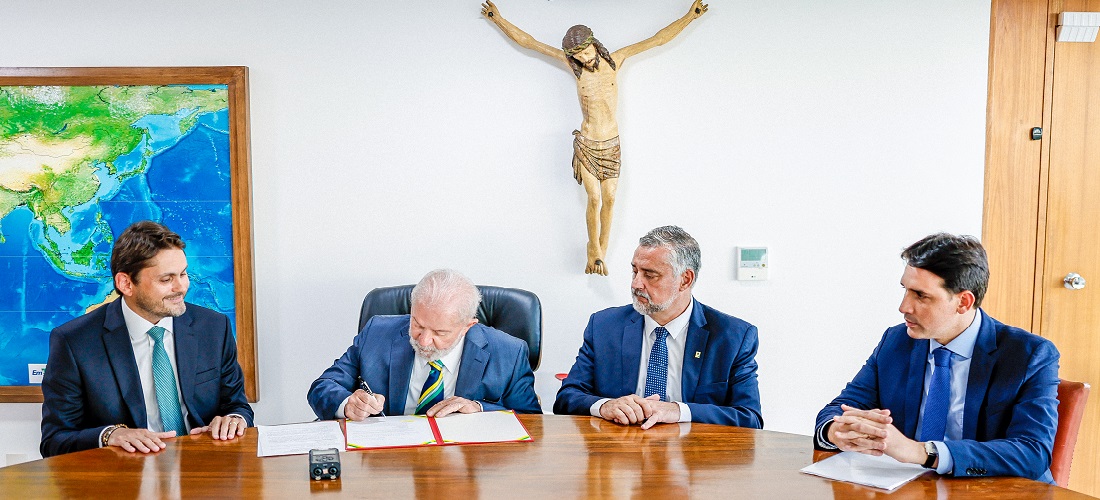
Lula Sanctions Law Upholding Pilotage Interests Following Dispute with the Navy
Jan, 16, 2024 Posted by Gabriel MalheirosWeek 202403
Brazilian president Luiz Inácio Lula da Silva sanctioned a law without any vetoes on Monday (15), regulating the pilotage activity and favoring pilots (responsible for maneuvering ships in ports) in their dispute against the Navy and shipping companies.
The proposal was approved by the National Congress in December, days after the Executive entered into negotiations on the issue, alerted by the Ministry of Defense.
The coordination involved discussions between the Navy, the Chief of Staff, and the Ministry of Finance. However, the Senate’s Infrastructure Commission endorsed the text approved by the Chamber before the government presented an alternative proposal.
The law signed by Lula establishes that the Navy will be responsible for regulating the pilotage sector—a profession specialized in navigating vessels through narrow channels and berthing them in ports.
In Brazil, there are only 613 currently active pilots whose monthly income ranges from R$ 50,000 to R$ 300,000, according to sector associations.
The Maritime Authority was against the new attribution because it lacked trained specialists in economic regulation.
The original proposal, presented by the Jair Bolsonaro government, assigned the responsibility for setting prices or establishing parameters for defining contract values between shipping companies and pilots to the National Waterway Transportation Agency (Antaq), the sector’s regulator.
The Director of Ports and Coasts of the Navy, Admiral Renato Salgueirinho, told press agency Folha in December that removing economic regulation from Antaq’s attributions would be detrimental to the Naval Force.
“Economic regulation is important but needs expertise and data to establish a fair pricing system and verify abuses. We are equipped to ensure maritime safety. We are not suited to perform activities outside our duties,” he said.
The text also consecrates the rotation of pilots into law, a practice adopted in the last century by Brazil. In this format, military personnel create a monthly schedule with the names of all pilots to ensure that no ship arrives at ports without qualified professionals to berth them.
This model, used in Europe, Asia, and the Americas, aims to prevent shipowners from making agreements with few pilots, risking maritime safety due to professional fatigue, as ship accidents have a significant environmental impact and can affect the country’s import and export figures.
However, the rotation schedule requires shipping companies to sign contracts with the pilot designated by the Navy for that period, hindering free competition for the service.
Therefore, according to the Audit Court (TCU), the rotation model creates a monopoly for the pilotage sector. According to the analysis at the court, the average maneuver cost in Brazil is around R$ 7,500 per hour. The price is 2.6 times higher than the model in force in the United States.
Military personnel were critical of the law. They argued that the rotation is already part of the Navy regulations, and elevating it to the status of a federal norm will prevent the Navy from changing the rotation through an ordinance signed by the Commander of the Naval Forces.
The president of Praticagem do Brasil, the group’s association, Bruno Fonseca, said the law will guarantee more security to the sector.
“State representatives and senators had the keenness to study and discuss the matter to the exhaustion, hearing from more than a dozen stakeholders. As a result, we have the best regulatory standards for the activity, as shown by the minimal incident rate in our waters,” he said.
In a text published by the Presidency of the Republic, the government’s Communication Secretary under Lula played down the complaints made by the Navy and said that Antaq could assist the Navy in economic regulation in a consultative manner.
“With the presidential sanction, the norms applied by the Brazilian Navy will gain law status, thus providing greater legal certainty to pilot professionals and the waterway sector.”
Original report by Cézar Feitosa
Source: Folha de S. Paulo
Click here to access the original text in Portuguese: https://www1.folha.uol.com.br/mercado/2024/01/lula-sanciona-lei-que-favorece-praticagem-apos-disputa-contra-marinha.shtml
-
Fish
Feb, 13, 2025
0
CNA Discusses Import Risk Analysis for Tilapia
-
Ports and Terminals
Jul, 31, 2024
0
TCP accumulates record growth of 37%
-
Sugar and Ethanol
Aug, 27, 2021
0
OIA predicts global sugar deficit of 3.8 million tons in 2021/22
-
Steel and Aluminium
Sep, 21, 2021
0
Brazil applauds GCC’s decision not to impose safeguard on steel imports

